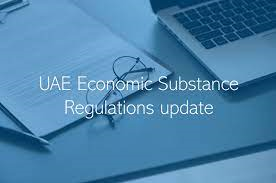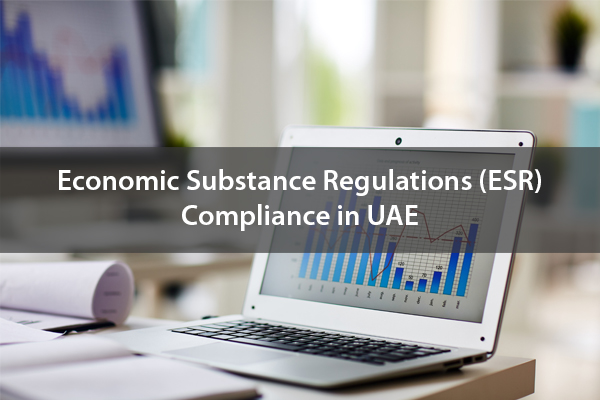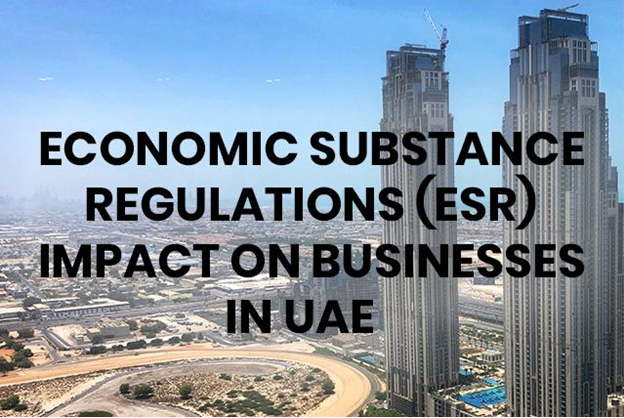The European Union blacklisted countries that do not meet EU fair taxation policies. This was an attempt to ensure compliance in the region and make sure companies were adhering to the laws. A similar attempt was made by the UAE government through ESR regulations. These regulations were introduced to prevent businesses from shifting their activities to other jurisdictions that have beneficial and more advantageous tax regimens.
This was a regulation to prevent profit shifting and maintain transparency in the operations. All companies operating in the UAE, whether mainland, free zone, or offshore are required to complete Economic Substance Regulations registration before the deadline. Under this law, the companies will have to file ESR notifications and submit ESR reporting. If you are operating in the UAE, or you plan to do that in the future, here is a guide to help you understand ESR regulations and remain compliant.

What are the Economic Substance Regulations in UAE?
Economic substance regulations are laws that regulate the economic activities of businesses in the UAE. The regulations are designed to protect consumers and ensure that businesses do not engage in fraudulent or deceptive practices. The rules also protect investors and prevent businesses from engaging in illegal activities.
The ESRs were created by Sheikh Mohammed bin Rashid Al Maktoum, Vice President and Prime Minister of the UAE and the Ruler of Dubai in order to create a strong economy with good business practices.
There are several different types of Economic Substance Regulations, including:
- Consumer Protection Regulations: These rules govern companies’ interactions with customers, including advertising practices and the disclosure of information about products sold.
- Investment Regulations: The ESR in Dubai governs companies’ interactions with investors, including disclosures about financial information and non-compete agreements.
- Antitrust and Competition Law: These Economic Substance Regulations in Dubai govern companies’ interactions with suppliers, competitors, distributors, and customers by regulating unfair business practices such as monopolistic pricing or anti-competitive behavior that prevents fair competition between companies.
The Purpose of Economic Substance Regulation
The ESR prohibits anyone from representing that they are offering goods or services when they are not, including misrepresentation about the nature, ingredients, features, benefits, results, or efficacy of any product or service. It also prohibits claims that are false or misleading about the time it takes to achieve results or impact personal health and well-being.
The primary purpose of the Economic Substance Regulations in Dubai is to ensure that economic activity is conducted in accordance with the law. That means that all transactions must be legitimate, transparent, and open to scrutiny by the officials. This includes everything from business practices to financial books.
The Economic Substance Regulations also help provide transparency for investors who want to invest their money into a company operating in the UAE.
This prohibition extends to all commercial advertising and promotional materials such as websites, social media posts, emails, and other forms of communication where consumers might be exposed to these false representations.
It is important to note that these regulations only apply to the companies incorporated in the UAE. Companies from outside of this jurisdiction will continue to comply to their own national laws when operating within it, which may include different legislation on Economic Substance Regulations in Dubai as well as different enforcement mechanisms for those laws.

Who is subject to the Economic Substance Regulations?
The Economic Substance Regulations apply to all onshore entities, including foreign ones. They also apply to:
- All UAE entities that are owned or controlled by a foreign entity and have a presence in the UAE; and
- All foreign entities operating in the UAE.
The UAE legal system is based on a combination of civil and sharia laws. The UAE has no jurisdiction over the interpretation of foreign laws and regulations, so the interpretation of these may differ between countries. In addition, the UAE Federal Supreme Court has the right to interpret all federal laws in order to ensure consistency across all emirates.
What do I need to do to ensure my business complies with the Economic Substance Regulations?
You should ensure your business complies with the Economic Substance Regulations in the UAE. This means that you need to:
- Be able to show that your business has economic substance, which is defined as a specific level of activity and capitalization necessary for its operation; and
- Have been operating in the UAE for at least three years, or if not operating at all then have been registered with a local authority (such as Dubai Land Department) since before 1 January 2009.
The Economic Substance Regulations in Dubai require you to have specific financial records and documentation in place. These include:
- A bank account showing at least AED 1,000 in cash or other liquid assets;
- An annually audited financial statement prepared by a certified public accountant; and
- Proof of your company’s ownership

What is my reporting obligation and when is it due?
The reporting obligation applies to all parties that are involved in an investment transaction, whether they are foreign or local, and also includes issuers who issue securities in their own name. It does not apply to individuals who participate only as investors in an investment transaction (i.e., they don’t have control over company affairs).
Economic Substance Regulations Reporting is due on a quarterly basis, with reports due at the end of each quarter within 60 days after the end of each quarter – i.e., you must submit your first report by March 31st (31st day), June 30th (30th day), September 30th (31st day), and December 31st (31st day).
Scope of Economic Substance Regulations in the UAE
This regulation does not apply to normal people, sole proprietors, trusts, and foundations. It only applies to any incorporated legal person or entity. Here are some industries:
- Banking Business
- Insurance Business
- Investment Fund Management Business
- Lease Finance Business
- Headquarters Business
- Shipping Business
- Holding Company Business
- Intellectual Property Business
- Distribution and Service Center Business
Businesses operating in these industries must obey the Economic Substance Regulation requirements —
- They must manage all income-generated activities as per the rules defined in the ESR
- They must operate according to the activities directed and managed within the UAE.
- Companies must consider the level of activities and functions such as:
- Businesses must have sufficient full-time qualified employees
- They must possess sufficient property and physical assets in the UAE
- A company must bear the amount of operating expenses in the UAE
What are the penalties if a company fails to comply with Economic Substance Regulations?
Complying with the latest Economic Substance Regulations in Dubai is mandatory for companies and businesses that fall into the category. If you don’t comply with the latest regulations and laws, here is how you will be penalized.
- Companies will be penalized anywhere between AED 10,000 to AED 50,000 if they fail to present adequate ESR and if they do not provide accurate and complete information about the relevant year.
- Businesses and companies will also be penalized anywhere between AED 10,000 to AED 50,000 if they fail to provide accurate and complete information about their exchange with a foreign parent company or about ultimate beneficial ownership.
- If a company or business fails to provide the necessary information as per the Economic Substance Regulations for two financial years, its license will be canceled. It will not be renewed and the business will have to pay a penalty between AED 100,000 to AED 500,00.
What is an accurate assessment to avoid penalties?
An accurate assessment is extremely critical because the incorrect assessment would lead to a lot of penalties. The penalties will start to accumulate and ultimately the amount will become more than you can afford. Thus, it is highly recommended to understand the Economic Substance Regulations and undertake accurate assessments on a yearly basis.
Here are some of the common mistakes businesses make when making an assessment:
- Self-assessment must be done based on the activities that are mentioned on the trade license
- Many people file wrong relevant activity because they do not understand the concept of “Relevant Activity” as per ESR regulations
- By ignoring the ESR notification and ESR reporting because they assume they are an exempt entity or they perform outside the scope of ESR
In addition to this, regulatory authorities verify the filings when they request a copy of financial statements from entities and businesses that have not filed even after the notification by claiming that they did not earn any income during the financial year.
What is the role of regulatory authorities for ESR?
Authorities play a major role to ensure all entities and businesses comply with the Economic Substance Regulations in Dubai. Here are some of the most important functions they perform to ensure that:
- Monitoring compliance with the requirements of filing the notification form and the Economic Substance Report as per the regulations in the country
- Helping companies understand and also assist them with proper Economic Substance Regulations registration
- Identifying possible licenses for companies and entities operating in different industries
- Validating information that is submitted by licensees
- Determining whether a specific or relevant entity meets the conditions for exemption from the ESR regulation
- Verifying the authenticity of the reports shared by businesses and entities
- Keeping a record of all the companies that meet the conditions and the companies that are exempt from the ESR regulations
- Sharing all the collected information with the UAE Federal Tax Authority and the UAE Ministry of Finance
Licensees who are exempted from Economic Substance Regulations in the UAE
Not all businesses and entities are mandated to file the ESR report. There is a set of rules to determine which entities will have to file the report and which are exempt from it. The following is a list of conditions that will determine which licenses are exempted from filing ESR in the UAE.
- Any tax-paying resident that resides outside the UAE
- Any investment fund and investment holding entities.
- A UAE resident-owned business that is completely owned by a resident of UAE that does not belong to any multinational group and the business is operated only in the UAE.
- Any branch of a foreign entity that has to pay taxes on all its relevant income earned within the foreign country’s jurisdiction.
If any licensee falls under this set of requirements, it will be exempted from filing the report for Economic Substance Regulations in Dubai. However, they are required to submit sufficient evidence along with a notification form to claim the exceptions. If they fail to do that on time, there will be consequences.
Some important facts about Economic Substance Regulations in Dubai
- These regulations apply to financial years that start on or after 1st January 2019
- Entities that are operating within the scope of these regulations are required to submit the following forms to their regulatory authority
- An annual notification form
- An economic substance report within 12 months from the date when the financial year ends
- If an entity has not earned income from a relevant activity or if they are exempted from the conditions, they are not required to submit an Economic Substance Report. However, they are still required to submit a notification form with sufficient information.
When are the Economic Substance Regulations expected to become effective?
The Economic Substance Regulations came into effect on 1st January 2020. As such, they apply to all UAE onshore entities and not just offshore entities that are incorporated in the UAE.
Economic Substance Regulations registration process in the UAE
For Economic Substance Regulations registration, you will need to provide your company name, address, contact information, and a list of products that you sell or plan to sell. You will also be required to provide evidence that you have been operating for at least six months before registering with the ESR.
You can register an ESR company by filling out an application form provided by DITC, or you can complete an online form by visiting their website.
Conclusion
The Economic Substance Regulations are a new legal requirement in the UAE for all onshore entities. The regulations will come into effect from July 1, 2019, and apply to all companies that carry out transactions with consumers or businesses in the UAE. The main intention behind these regulations is to ensure transparency and accountability when it comes to business transactions in Dubai and Abu Dhabi. Since it is mandatory, you must ensure you understand all the requirements and submit your report accordingly.

